Gold: Election Year Trends Point to Bearish Follow-Up to Thanksgiving Weekend
2024.11.27 16:34
Today we finally see it – the moved lower at last. USD’s breather here is nothing surprising, and it’s not bearish either.
It’s simply normal for a market to correct after launching a rally as strong as what we saw in October and November.
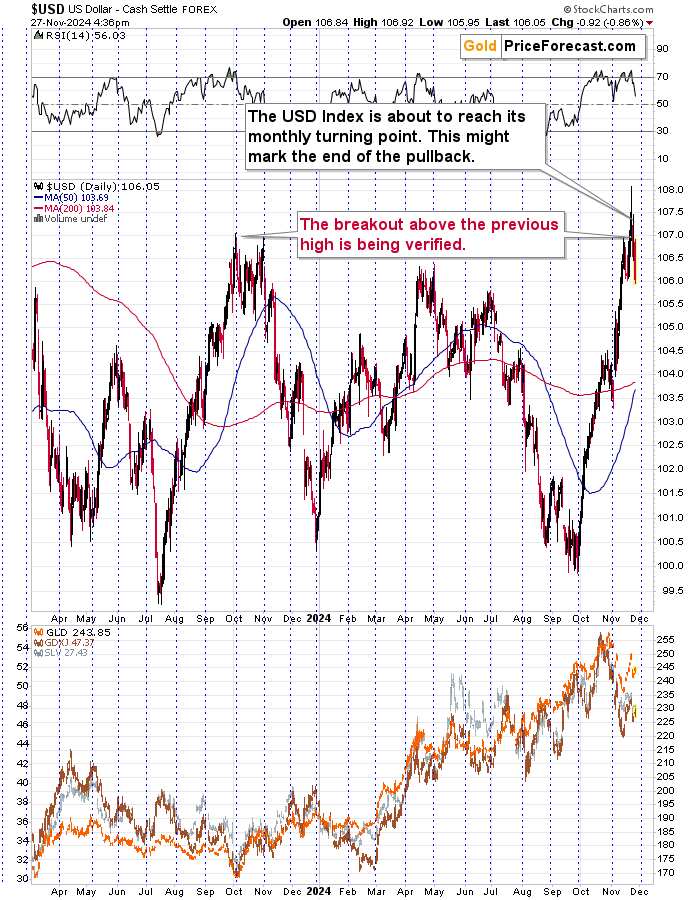
In analysis, I wrote the following about the above chart:
Yes, while I have been writing about USD Index’s likely strength and bullish outlook overall, this kind of resilience is surprising even to me. I thought that we’ll see a bigger correction now – after all, the USDX soared by 8 index points without a bigger decline.
We don’t see it now, which could mean that it will still happen in the following days, or that the momentum for the USD is so remarkably strong that it will just consolidate and trade sideways here instead of really correcting.
Either way, after this week, the USDX could be back in the rally mode due to the monthly turning point (vertical, dashed line). My Monday’s comments on it remain up-to-date:
“Will we see a correction shortly? That’s quite possible. After all, no market moves up or down in a straight line without periodic corrections.
Will the correction in the USDX trigger a rally in and miners? I wouldn’t say that’s necessary. The most recent boost that both markets got was based on geopolitical turmoil (a new type of rocked used by Russia), and those tend to have only temporary impact on prices. Today’s move lower in gold and USDX confirms this. So, it is quite possible that we would see a decline in gold and the USD Index at the same time. “
So, yes, the pullback is taking place, which means that the monthly turning point can play out exactly as I had described it earlier – it could push the USDX higher once again. This would likely contribute to declines in the values of precious metals and mining stocks.
Today’s action in the precious metals sector already confirms this bearish outlook.

After the early move up, gold, silver, and miners moved lower. Overall, gold and miners are up, but not significantly so. The key thing is that they moved up in an insignificant manner while the USDX declined in a meaningful way (from a day-to-day point of view only, but still).
PMs and miners had a good reason to rally today – in a big way – and they didn’t. This suggests that they really want to decline in the following weeks. Fortunately, you are already well-positioned to take advantage of this decline. Your profits in the current short position are likely to grow.
Before summarizing, we would like to discuss one specific thing: gold’s performance around Thanksgiving – during the U.S. presidential election years.
The below text is actually based on something that I wrote four years ago. Since it was about an even more distant past, it remains just as up-to-date as it was back then. Of course, I’ll add comments on what happened in 2020.
Gold’s Performance around Thanksgiving
Thanksgiving is on the fourth Thursday of each November, which means that the holiday always falls between November 22 and 28. What’s usually happening to the price of gold before and after this period? Let’s check gold’s seasonality for Q4.
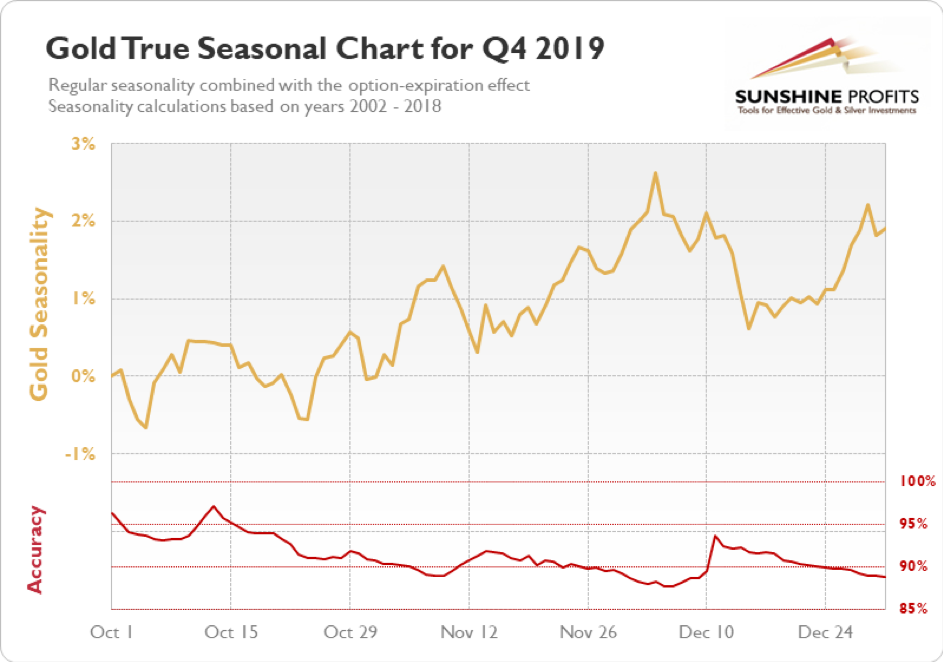
During this period, gold is usually just before forming a short-term top and starting the biggest decline within the final quarter of the year.
Please note that the accuracy measure as to when the top is likely to be is relatively low, but soars right before gold’s plunge. This means that while it’s not that clear when gold is likely to top, it’s quite probable that we are going to see some kind of important top regardless of when exactly that takes place. Could it be slightly ahead of Thanksgiving? Yes. Could it be slightly after it? That’s possible as well.
But this year is not like other years. This year, particularly this November, is special because of the U.S. presidential elections. Therefore, instead of taking into account the average of the previous periods around all recent Thanksgivings, one should focus on the Thanksgivings which were concurrent with presidential elections.
Gold and Thanksgiving during the Presidential Election Years
Let’s examine the last five cases when gold was already after the 1999-2000 bottom and within its secular bull market.
Starting with the most recent case:
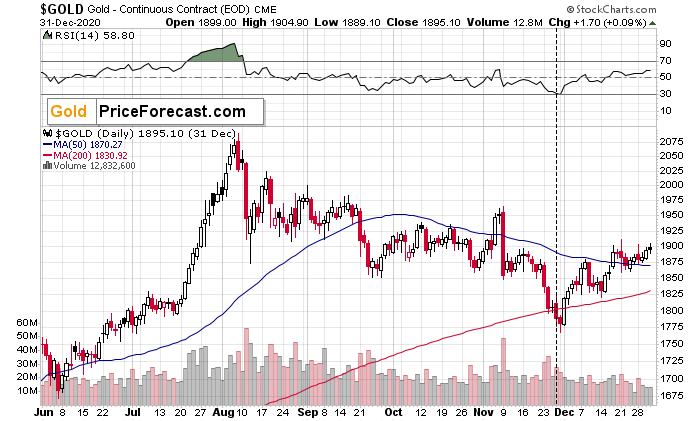
Back in 2020, gold price was after a several-month-long decline, and it reversed soon after Thanksgiving. So, it was an exception from the rule. Perhaps the longer decline preceding Thanksgiving was something that could have indicated that we’d see a turnaround instead of decline’s continuation.
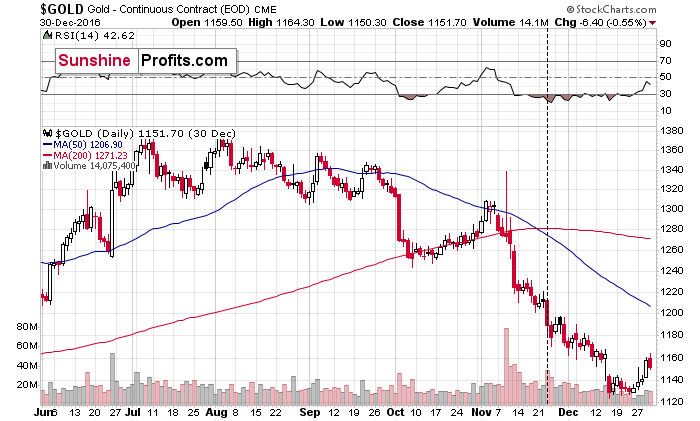
Back in 2016, the decline simply continued after Thanksgiving, and gold bottomed in the second half of December.
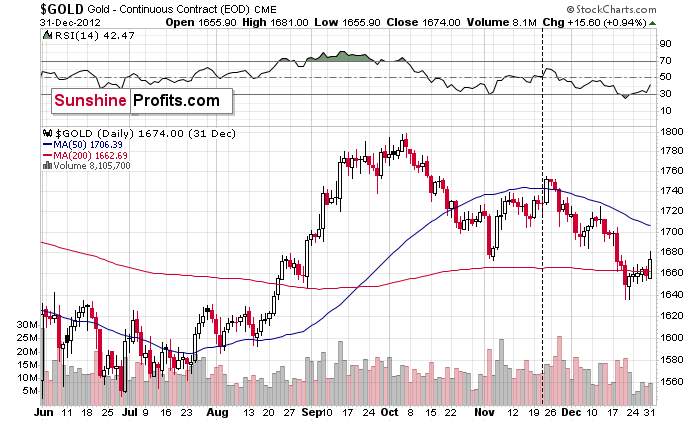
Four years earlier, in 2012, gold topped right after Thanksgiving and – just like in 2016 – it bottomed in the second half of December.

In 2008, gold topped right before Thanksgiving, and it bottomed in the first half of December.
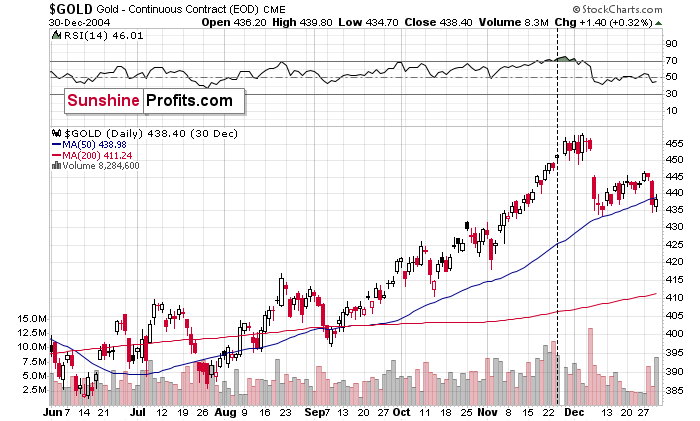
Finally, in 2004, gold topped shortly after Thanksgiving, and it formed an initial bottom in the first half of December. However, it then declined once again, further reaching the bottom in January and February 2005 (two separate bottoms).
Consequently, Thanksgiving during the U.S. presidential election year had a bearish follow-up for gold in most cases.
Most importantly, the 2016 follow-up was bearish. This analogy seems most important as that was also the year when Trump won.
This pattern fits in line with my other thoughts on the gold market. As the USD Index appears to be correcting here – and about to reverse based on its monthly reversal tendencies, it seems that gold will have more reasons to decline.
All in all, while there remain some opportunities to gain something extra on gold investments in the long run, the outlook for the precious metals market remains bearish for the following weeks. And the profits from our short position in junior miners are likely to grow further.







